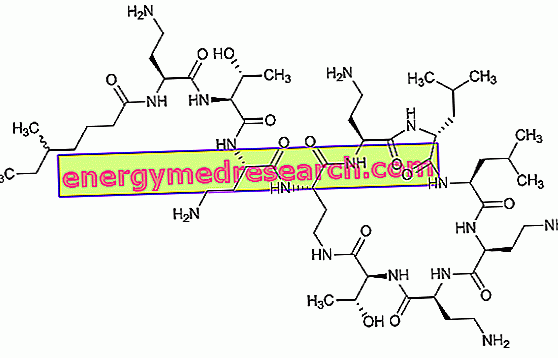Colistin is an antibiotic of natural origin produced by Aerobacillus colistinus .
Because of its nephrotoxicity, colistin is a last-choice antibiotic in the treatment of infections caused by bacteria such as Pseudomonas aeruginosa, Klebsiella pneumonia and Acinetobacter which are resistant to treatment with other types of antibiotics.
Generally, in medicinal preparations colistin is found in the form of colistimethate sodium (hereinafter, however, it will be called simply colistin).
Colistin is marketed as a powder for solution to be nebulized (inhaled administration) and as a powder and solvent for solution for injection or infusion.

Indications
For what it uses
The use of colistin is indicated for the treatment of:
- Lung infections caused by Pseudomonas aeruginosa in patients with cystic fibrosis (inhaled administration);
- Serious infections caused by Gram-negative bacteria resistant to other antibiotics (parenteral administration).
Warnings
Before taking colistin you must inform your doctor if you are in any of the following conditions:
- If you suffer - or have suffered in the past - from kidney disease;
- If you suffer from porphyria (a metabolic disease);
- If you suffer from asthma.
The use of colistin in newborns and premature babies must be done very carefully, as their kidneys are not yet fully developed.
Colistin can cause unwanted effects that can alter the ability to drive and / or use machinery, so care should be taken.
Interactions
Colistin can increase the muscle relaxant effects of anesthetic drugs .
The simultaneous intake of colistin and drugs such as cephalothin (a cephalosporin), gentamicin, amikacin, netilmicin and tobramycin should be avoided due to the increased risk of renal toxicity.
In any case, you must inform your doctor if you are taking - or have recently been taken - drugs of any kind, including non-prescription medicines and herbal and / or homeopathic products.
Side effects
Colistin can cause various types of side effects, although not all patients experience them. The type of adverse effects and the intensity with which they occur depend on the different sensitivity that each individual has towards the drug.
The main adverse effects that can occur during colistin treatment are listed below.
Allergic reactions
Colistin can trigger allergic reactions in sensitive individuals. These reactions can manifest with symptoms such as:
- Shortness of breath;
- Breathing difficulties;
- Collapse;
- Skin eruptions;
- Urticaria;
- Itch.
Kidney and urinary tract disorders
Treatment with colistin may cause:
- Kidney failure;
- Increased azotemia and creatinemia;
- Reduction of the excreted urine volume.
Nervous system disorders
Colistin therapy may cause:
- Numbness or tingling around the face;
- Dizziness or loss of balance;
- Dizziness;
- Paralysis of the chest muscles resulting in respiratory incapacity;
- Weakness;
- Difficulty of the word;
- Confusion;
- Loss of sense of reality.
Other side effects
Other side effects that may occur during colistin therapy are:
- Temperature;
- Visual problems;
- Diarrhea;
- Alterations in blood pressure;
- Hot flashes.
Side effects typical of inhaled administration
In addition to some of the side effects already listed, colistin - when administered by inhalation - can also cause:
- Chest constriction;
- breathlessness;
- Cough;
- Feeling of being out of breath;
- Mouth ulcers;
- Sore throat.
Overdose
If an overdose of colistin is taken, symptoms such as:
- dizziness;
- Stunning;
- Flushing;
- Lethargy;
- Confusion;
- Ataxia;
- Facial paresthesia;
- Psychosis;
- nystagmus;
- Difficulty swallowing;
- Muscle weakness;
- Breathing difficulties;
- Apnea;
- Severe kidney disorders.
If you suspect a colistin overdose, you should immediately inform your doctor.
Action mechanism
Colistin is active against Gram-negative bacteria. It exerts its antimicrobial action by altering the permeability of the external membrane typical of Gram-negatives and is also able to alter the permeability of their cytoplasmic membrane.
More precisely, colistin functions as a sort of "detergent" that interacts with the lipopolysaccharide of the outer membrane and with the phospholipids of the cytoplasmic membrane. These interactions alter the permeability of the membranes, thus favoring the escape of metabolites from the bacterial cell which eventually dies.
Mode of Use - Posology
As mentioned above, colistin is available for inhalation administration (in the form of a powder for solution to be sprayed) and for intravenous administration (in the form of powder and solvent for solution for injection or infusion).
Below are some indications on colistin doses usually used in therapy.
Regardless of the route of administration chosen, patients with renal insufficiency will receive smaller doses of antibiotic than those usually administered.
Administration by inhalation
In adults, the dose of colistin usually administered is 1-2 million IU to be taken two or three times a day.
In children from 2 years of age and in adolescents up to 17 years of age, the dose of colistin usually used is 1-2 million IU to be taken twice a day.
In children under 2 years of age, the colistin dose usually administered is 1 million IU given twice a day.
Intravenous administration
In adults, the dose of colistin usually administered is 9, 000, 000 IU, to be divided into two or three administrations. In case of very serious infections, the doctor may decide to increase the dose of the drug administered.
In children with a body weight of 40 kg or less, the usual colistin dose is 70, 000-75, 000 IU / kg body weight, to be administered in three divided doses.
Pregnancy and breastfeeding
The use of colistin by pregnant women and by breast-feeding mothers is generally contraindicated. In fact, the drug can cause harm to the fetus and, being excreted in breast milk, can also damage the infant.
In any case, pregnant women and breastfeeding mothers, before taking any type of medication, should always seek medical advice.
Contraindications
The use of colistin is contraindicated in the following cases:
- In patients with known hypersensitivity to the colistin itself;
- In patients with myasthenia gravis, since colistin can make some symptoms worse;
- In pregnancy and during lactation.



